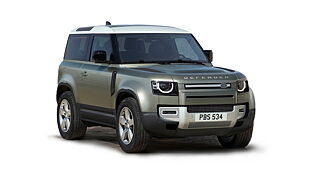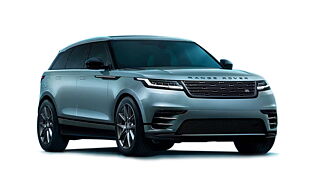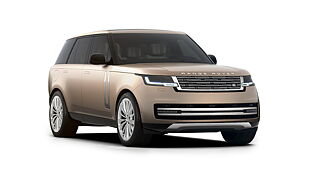What is it?

Why would I buy it?
Design, Comfort, Easy of driving
Why would I avoid it?
Hard plastic at places, low boot space height
Meet the Velar. It might be based on the same platform as the Jaguar F-Pace, but its design is unmistakably Range Rover. And it's a great design at that. In fact, I will stick my neck out and say that it's the best I have seen from Land Rover in the recent past.
The idea behind the Velar was to go minimalist. And so, there are very few design lines that catch your attention. It's all about surfacing on the Velar. The broad shoulder, the hunkered down stance, and the huge chunks of uninterrupted bodywork give it a solid and desirable aura.

And it takes 'flush-fitting' a tad too seriously as well. So, the grille, the lamps and even the door handles fit flush with the body. The latter are of the 'pop-out' variety which also make for a good party trick.
Now, the Velar you see here – the P250 SE – isn't the top of the line version. It's somewhere in the middle of the 25 versions that are on sale in India. Yes, you read that right – 25 trims to choose from! So, this test car doesn't get bigger wheels or a contrasting roof or even a more in-your-face bumper, all of which further enhance the Velar 's visual appeal.
But, like I said at the start, it's still quite a looker.

How is it on the inside?

Land Rover has used the same minimalist philosophy on the inside as well. But, it has peppered the interiors with enough visual drama to entice. The new Touch Pro system is lovely. It has two screens – a tilt-adjustable one in the dash, and one in the central console. And both have great resolutions and touch interface. And there are quite a few things to select, change and read off them as well.

That's not all. A lot of that information is also displayed as part of the instrument cluster and can be accessed via the steering buttons. The only catch is, the menu here is a bit too tedious to go through. The steering buttons meanwhile are touch sensitive. And this newness feels good initially. But when it changes volume and music while going around corners unexpectedly because your thumb has shifted a bit, it can get quite irritating.

Quality wise, the Velar is just about par for the course. It doesn't set any new benchmarks, and you can still find some hard plastic around. Also the operability of the various buttons, stalks, knobs and dials, doesn't have the same well-engineered feel to it as seen on some Germans. Overall though, it still feels luxurious and new and inviting. As do the seats. The ones at the back come with electric recline function, and these are adequately wide and cushy to make long journeys effortless. The rear passengers also get two separate aircon zones and there's enough leg and head room to make the Velar a genuine and comfortable GT machine.

The seats at the front work well too. These are 10-way adjustable and the driver side comes with memory function as well. There's enough side bolstering to hold you in place when cornering and even though these aren't sofa-soft, these are supple enough to bring out a sigh of relief at the end of a hard day's work.

Now I could rattle off the near endless list of features the Velar comes with as standard, but I thought a screenshot of the PDF that says the same would make more sense. So, here it is...

How does it drive?

Like a sporty SUV should. It's no car. And it's heavy. So, when you go into a corner, you will feel the Velar's heft in the way it dives and then rolls. But, it's not too pronounced. And with its rear bias power delivery, 255-section tyres, and torque vectoring, you'd have to be really pushing it to get it to understeer. It loves the long and fast corners and straight line drags. And if driven sensibly, it will take on the tighter, twister bit as well. But, sporty or not, it's still an SUV.

And that means when the going gets rough, the Velar begins to shine brighter. The 19-inch wheels with higher profile tyres help. And the suspension too is absorbent and quiet. It doesn't get unsettled by the undulations at speeds; it barely mumbles over road joints and broken tarmac patches; and even the sharper, squared out bumps don't exactly shock your spine. The steering is nice as it strikes a good balance between being light and alert. The visibility is handy especially for a long SUV. And the throttle response, is well measured. And all of this together makes the Velar a surprisingly easy SUV to drive around.

And lest we forget, there are six driving modes to choose from. I mostly left it in Comfort, but there's Dynamic that adds weight to the steering, makes the throttle response more alert and brings an overall spring to the Velar's steps. There's also the boring Eco mode and three off-road modes. Now, we didn't go looking for any challenging trails with the Velar. And we only once used the Gravel mode for our short off-the-road excursion. But it did tell us that in typical Range Rover style, this too has good wheel articulation and gradient tackling ability.

As far as engines go, our Velar is the petrol-powered version. It is powered by JLR's new-age Ingenium family of engines. It displaces 1997cc and is rated at almost 250bhp. Also, thanks to a turbocharger, the 4-cylinder unit manages to churn out 365Nm of peak torque from just 1500rpm! The engine is refined and torquey in the low and mid range – which is where you'd end up driving it almost 99 per cent of the time. And when you decide to rev it to its redline, besides the turbo whistle, a little more engine noise and the engine losing some of its accelerative oomph, there isn't much to complain about.

But, if you are more of a diesel person, there are 2- and 3-litre engine options with four and six cylinders respectively to choose from as well. All engines, meanwhile, are mated to a smooth shifting – if not the most alert – 8-speed torque converter automatic. It comes with Sport mode and steering mounted paddle shifters.
Should I buy one?

The Velar range in India starts at almost Rs 80 lakhs. Our test car though, the SE version, is priced at Rs 85 lakhs. Both ex-showroom prices. This makes it dearer than the top-spec Evoque by Rs 25 lakhs. And, variant for variant, it is Rs 10 lakhs more expensive than the roomier, more versatile and larger-engined New Discovery.
So, you'd buy the Velar for two simple reasons. First, are its looks. This is one handsome SUV, and something you'd love to flaunt. That it is comfortable and easy to drive and quick, is just a bonus. And second, well, it doesn't matter. Just look at the way it looks!
Where does it fit in?

The Velar traditionally goes up against the Porsche Macan, and its own sibling, the Jaguar F-Pace. But, it is also an alternative to the likes of the Audi Q7 and the Mercedes-Benz GLS, although with two less seats.
And then if we were to look at sporty SUVs, the Range Rover also has competition in the BMW X6 and the Mercedes GLE Coupe. Now, the prices for the latter two inch towards the crore mark. But then again, with 25 trims and prices ranging from 80 lakhs to almost 1.4 crore, there seems to be a Velar alternative for every possible luxury SUV on sale in India. How’s that for covering your bases?
Pictures: Ameya Dandekar

![Land Rover Range Rover Velar [2017-2023] Exterior Land Rover Range Rover Velar [2017-2023] Exterior](https://imgd.aeplcdn.com/642x361/cw/ec/33606/Land-Rover-Range-Rover-Velar-Exterior-123241.jpg?wm=1&q=80)
![Land Rover Range Rover Velar [2017-2023] Exterior Land Rover Range Rover Velar [2017-2023] Exterior](https://imgd.aeplcdn.com/642x361/cw/ec/33606/Land-Rover-Range-Rover-Velar-Exterior-123292.jpg?wm=1&q=80)
![Land Rover Range Rover Velar [2017-2023] Exterior Land Rover Range Rover Velar [2017-2023] Exterior](https://imgd.aeplcdn.com/642x361/cw/ec/33606/Land-Rover-Range-Rover-Velar-Exterior-123268.jpg?wm=1&q=80)
![Land Rover Range Rover Velar [2017-2023] Exterior Land Rover Range Rover Velar [2017-2023] Exterior](https://imgd.aeplcdn.com/642x361/cw/ec/33606/Land-Rover-Range-Rover-Velar-Exterior-123269.jpg?wm=1&q=80)
![Land Rover Range Rover Velar [2017-2023] Exterior Land Rover Range Rover Velar [2017-2023] Exterior](https://imgd.aeplcdn.com/642x361/cw/ec/33606/Land-Rover-Range-Rover-Velar-Exterior-123270.jpg?wm=1&q=80)
![Land Rover Range Rover Velar [2017-2023] Exterior Land Rover Range Rover Velar [2017-2023] Exterior](https://imgd.aeplcdn.com/642x361/cw/ec/33606/Land-Rover-Range-Rover-Velar-Exterior-123271.jpg?wm=1&q=80)
![Land Rover Range Rover Velar [2017-2023] Exterior Land Rover Range Rover Velar [2017-2023] Exterior](https://imgd.aeplcdn.com/642x361/cw/ec/33606/Land-Rover-Range-Rover-Velar-Exterior-123272.jpg?wm=1&q=80)
![Land Rover Range Rover Velar [2017-2023] Exterior Land Rover Range Rover Velar [2017-2023] Exterior](https://imgd.aeplcdn.com/642x361/cw/ec/33606/Land-Rover-Range-Rover-Velar-Exterior-123285.jpg?wm=1&q=80)
![Land Rover Range Rover Velar [2017-2023] Image Land Rover Range Rover Velar [2017-2023] Image](https://imgd.aeplcdn.com/272x153/cw/ec/28085/Land-Rover-Range-Rover-Velar-Exterior-114227.jpg?wm=0&q=80)
























